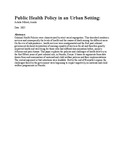| dc.description.abstract | Colonial Health Policies were characterized by strict racial segregation . This described residence, services and consequently the levels of health and the causes of death among the different races. On the eve of independence , health services were amalgamated and the first post colonial government declared its intention of ensuing equality of services for all and therefore greatly improved health and well being for those who had suffered discrimination before, namely Africans and poor Asians. This paper explores the policies and challenges of health delivery in the first fifteen years of post colonial rule, in Nairobi, Kenya. It bases its arguments from data drawn from and examination of maternal and child welfare policies and their implementations. The central argument is that intentions were laudable. But by the end of Kenyatta’s regime the challenges faced by the government were beginning to impact negatively on maternal and child welfare programmes in Nairobi. | en |

